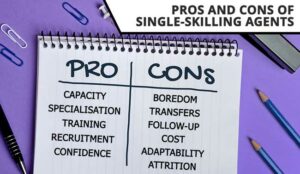In this article George Dixon outlines the pros and cons of multi-skilling contact centre advisors, and sets out some key recommendations to help businesses decide.

The question of whether or not to cross-train your agents, and to what extent, has been around since the rise of the very first contact centres more than half a century ago.
It’s a complex conundrum, with a number of factors to consider, depending on the nature of your business.
Read on for the pros, the cons, and our key recommendations on this contentious subject.
Make Sure That Agents Are Trained in the Basics – No Matter What
First things first: regardless of the size of your company, it goes without saying that each operative should be trained in every facet of their own service band.
This is to say that an inbound call handler, for example, should be capable of dealing with every type of customer service query, from deliveries to returns and general product advice.
There should never be a need for an agent in one band to transfer the call to another in the same one; if that call contains various query types, the operative should be capable of resolving them all.
Transferring calls means more hold time, which will only serve to further dampen the customer’s experience – it comes across as inconvenient and unnecessary (which it is, given that training an agent in all areas of customer service usually takes little more time and effort than training them only in some).
The situation is similar for outbound agents, who should be trained to deal with most, if not all, complications known to arise in the course of processing orders – declined card payments, for example, or arranging deliveries to obscure new addresses.
Having semi-skilled operatives is particularly hazardous in this scenario, since there’s a risk that the customer will lose patience with any less efficient agents they encounter, and cancel the order completely.
Ensuring an advanced level of training is not only good for the overall customer experience, it also helps to raise workforce morale, since an agent with a more developed skills base is likely to feel more valued as an employee, have a less monotonous working day, and feel more optimistic about their future career prospects, whether at your company or elsewhere.
Once your agents are capable of resolving the vast majority of calls within their own department, the question then becomes whether to train your staff trans-departmentally, so that inbound agents can also process orders, for example, or sales agents are able to handle any spontaneous queries the customer may bring up while they’re on the phone.
In a perfect world, of course, the answer would always be yes; clearly, having a more knowledgeable staff base can only lead to an easier and less cumbersome experience for your customers.
In reality, however, there are several issues which need to be taken into account before making a decision.
To discover the benefits and pitfalls of multi-skilling in the contact centre, read our article: How to Introduce Multi-Skilling Into the Contact Centre
Analyse Your Operations
The first of these to consider is the actual customer demand for upskilled operatives, since there’s a possibility that the need for them is too small to warrant the time and money required to put them in place.
To find out if this applies to you, have your Quality Assurance team run a widescale analysis on your recent call trends.
- How many outbound/sales calls did the customer interrupt to follow up on an outstanding query?
- How many orders were delayed or cancelled as a result of the ensuing frustration?
- How much time was wasted convincing callers to contact your customer services about the issue, or keeping them on hold whilst the agent scrambled to get advice from a manager or someone else in the know?
- And, most importantly, how many customers have been dissatisfied with the level of service given, feeling that the call handler was inexperienced or incompetent?
Once you have this information, you will be able to create a cost–benefit forecast for upskilling your agents.
In most cases, you’ll find that making the investment will yield dividends in the long term, but this does depend on the complexity of your business; if yours is a fairly linear service where the type of complaint doesn’t vary greatly, the process of multi-skilling your staff will be far less pricey than doing so for a larger, more diverse operation.
In the end, unfortunately, your choice here will have to come down to costs and figures – everyone wants an expert staff base, but it’s no good training them up to a perfect standard if the cost will render your company unable to survive into next year.
Know Where to Begin – and Who to Begin With
Assuming that it is feasible to proceed, the next thing to do is to examine your staff turnover rate. If found to be below par, it would be wise to investigate the reasons for this.
Look into everything from their pay rate, relative to your competitors, to the perks of the job and the user-friendliness of your software systems.
Until the turnover rate has improved, it would be inadvisable to invest in widespread cross-training, since there’s a high likelihood that your staff won’t be hanging around long enough to make proper use of it.
Instead, try to identify some of your most dedicated and experienced employees – those you’re confident are in it for the long haul – and concentrate your upskilling efforts only on them. You can then facilitate the process by using the agents’ natural strengths as a starting point for the cross-training.
For example, you may wish to train your computer-savvy employees in back office first of all, or those with great English skills in more correspondence-based duties, such as webchat and email communications.
Once your overall staff retention begins to improve, these agents can then be asked to help with training up the rest of the workforce
Read our article How to Calculate Attrition Rate – The Formula to discover how to measure and calculate attrition rates in the contact centre.
Analyse Your Complaint Type Channels and Ratios, and How They Change Over Time
If your contact centre already has a good staff turnover rate (kudos to you), it is likely that both your customers and your profit margins will benefit significantly from multi-skilling your agents.
The next question to consider, then, is where to begin?
Through forecasting, planning and detailed analysis of the ratio of your most common complaint types, it will quickly become obvious which areas to prioritize in the training-up process.
For example, if you are a retailer of small electrical items, and your prevalent query type concerns the delivery service rather than the actual quality and longevity of your goods, it would make sense to concentrate your training in areas such as tracking and courier communications, before moving on to less “popular” query types, like product advice and returns.

This way, you can address any backlog in unresolved complaints and, at the same time, ensure a reduction in overall call times.
As well as proper prioritization, it is likely that your company would benefit from a dynamic approach to internal training, rather than a blanket, one-size-fits-all policy.
This is a particularly prudent tactic if the challenges your business faces differ greatly depending on the time of the year.
For instance, let’s say that the vast majority of your annual orders are processed in the run-up to Christmas.
It would make sense to expect a surge in tracking requests around mid-December, as anxious customers get in touch to chase up on their deliveries. Then, in January, there may be a sharp rise in returns requests, as those inevitable unwanted/unsuitable gifts are reported.
In this scenario, it would be wise to ensure that all outbound agents are trained, at least to some degree, in tracking and returns, so that any queries that arise can be swiftly dealt with while the customer is on the line, rather than having them make contact with Customer Services.
Each time an outbound agent successfully achieves this, a call to your inbound team is most likely prevented – hence freeing up another agent to make an outbound/sales call and process another of those all-important outstanding orders.
Similarly, if your business is more susceptible than most to the knock-on effects of political decisions, it is always wise to keep a close eye on current affairs. This way, you’ll be in a good position to react to them when necessary.
Let’s say, for example, that you are a supplier of garden-based products; with a clear summer forecast, you’ve just sold a record number of hosepipes: all good news, until it’s reported that they are soon to be banned due to an extended heatwave.
In anticipation of this, it would be wise to ensure that your agents are equipped to deal with returns, and told to expect a surge in queries.
As well as complaint type ratios, it is important to be aware of the changing means by which your customers are contacting you; if the customer preference is trending towards webchat rather than traditional phone calls, for example, then it is worth adapting your multi-skilling efforts accordingly.
This way, your workforce will stay prepared for dealing with evolving customer inclinations, over time.
For more information on complaints handling in the contact centre, read our article: 21 Ways to Improve Complaints Handling in Your Contact Centre
Know How Many Staff to Train, and to What Extent
As Steve Jobs is purported to have said, “Do not try to do everything. Do one thing well”- and this is a good rule of thumb to follow.
Depending on your specific business needs, it is rarely necessary to upskill all employees to an immaculate level.

In fact, doing so can actually backfire, since there’s a risk of your operatives becoming overstretched – adequate at many things, but expert at none.
However, all permanent staff should be trained to handle most queries a customer is likely to raise, at least to the extent of minimizing the chances of a further call-in.
This does not necessarily mean resolving the query entirely; it could just require having the ability to take thorough audit log notes and know exactly which team to assign the query to.
Of course, the more in-depth back-office training you can afford your staff, the better, since this will shorten complaint resolution times even further, leading to an improvement in overall customer satisfaction levels.
The Bottom Line
Ultimately, the benefits of cross-training your staff rather than keeping them single-skilled tend to greatly outweigh the negatives.
In fact, multi-skilling can be crucial to the survival of a business, since it generally improves the customer experience and helps maximize staff flexibility – allowing them to be mobilized quickly in the face of changing conditions.
However, good forecasting, particularly of training costs, is extremely important, as is having an intricate knowledge of your staff’s individual and collective strengths and weaknesses. Because multi-skilling your agents badly and/or with poor planning can be worse than not multi-skilling them at all.
Has multi-skilling been an effective policy for your contact centre, or do more linear agent duties work for you?
Written by: George Dixon
If you want to discover more great insights from George, read these articles next:
- 10 Customer Service Behaviours Every Contact Centre Agent Should Have
- 7 Key Ideas for Winning Customer Loyalty
- The Five Cs of Customer Service
- 12 Ideas to Keep Agents Engaged During Meetings and Training Sessions
Author: George Dixon
Reviewed by: Robyn Coppell
Published On: 7th Sep 2022 - Last modified: 6th Jan 2026
Read more about - Call Centre Management, Agent Performance, Editor's Picks, Employee Engagement, Empowering Agents, George Dixon, Management Strategies, Multi-Skilling, Skill Development, Team Management


















